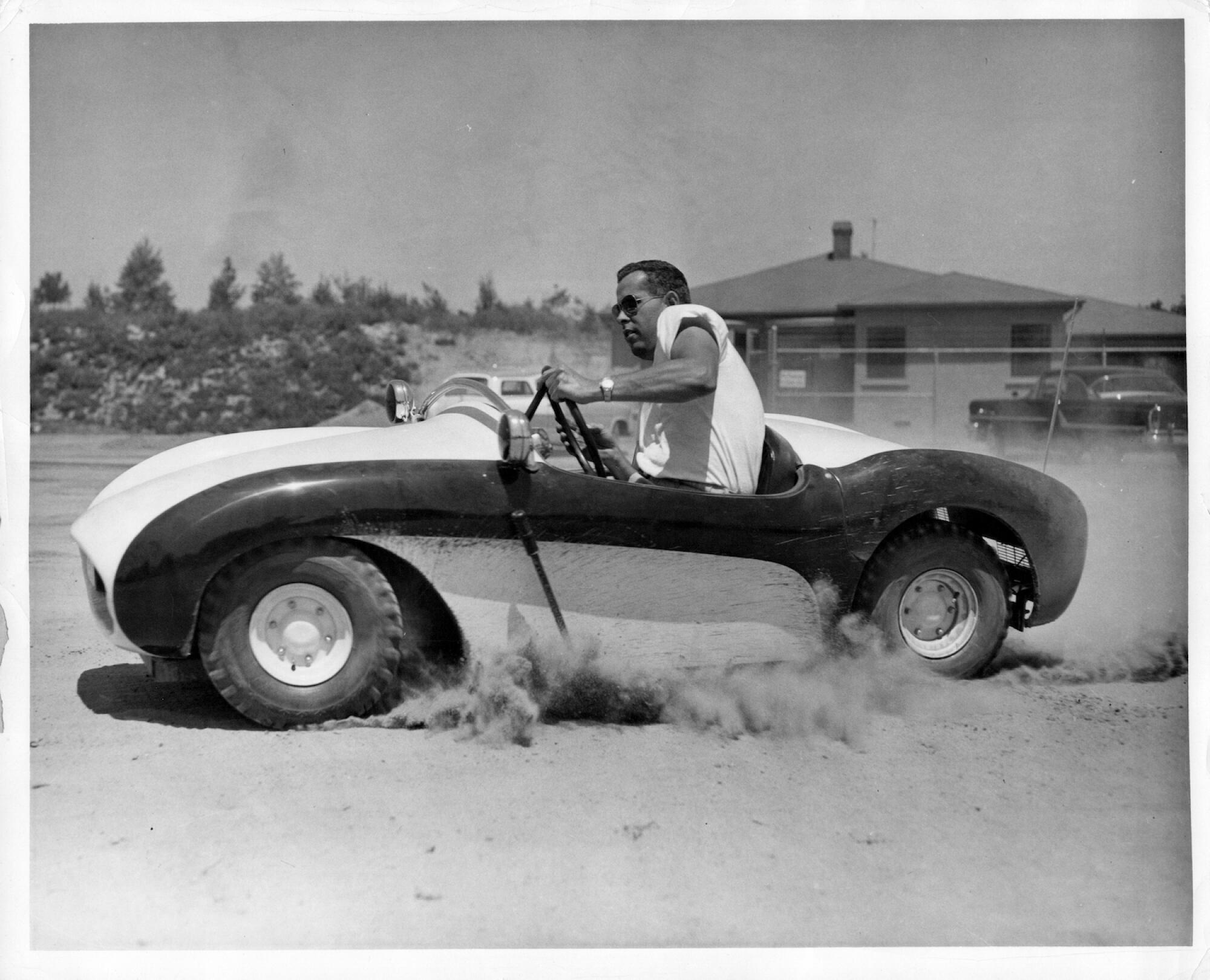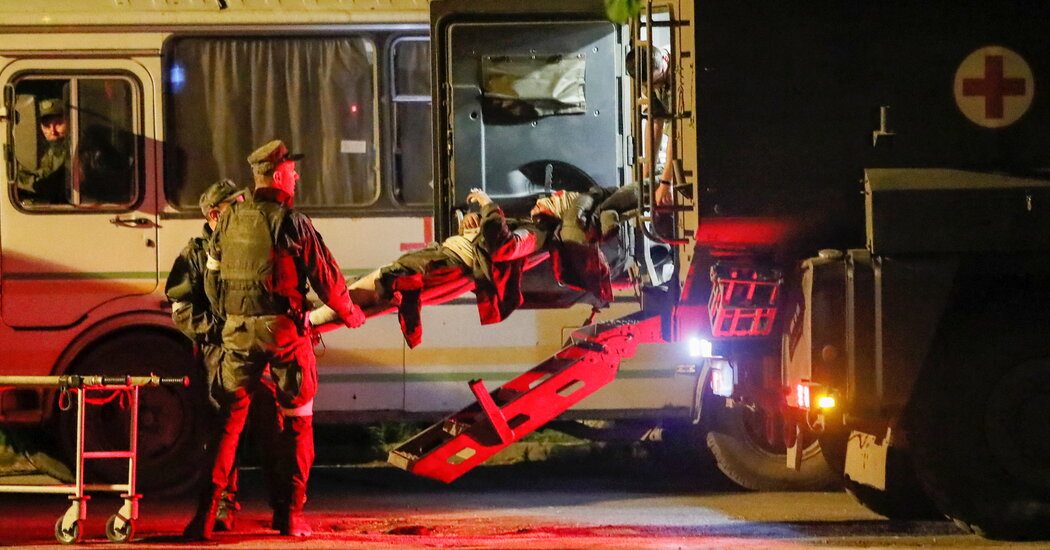Bob Gurr has typically joked that if it’s at Disneyland and it strikes, he probably had a hand in its design. Gurr first began working for Disney in late 1954, simply months earlier than Disneyland would open in July 1955, and is likely one of the figures instrumental within the look, really feel and tone of the park.
Gurr was the pivotal designer behind the Autopia automobiles, the Disneyland Monorail, the Matterhorn Bobsleds and the tomb-like trip automobiles — the “doom buggies” — of the Haunted Mansion. However there’s one in every of his designs that’s typically missed by followers, and it holds a particular place in Gurr’s coronary heart: a bit of crimson classic hearth engine that may repeatedly be noticed on Important Avenue, U.S.A., Disneyland’s introductory land.
Bob Gurr take a look at driving an Autopia car. Disneyland’s Autopia was Gurr’s first main Disneyland venture.
(Courtesy of Bob Gurr.)
The Los Angeles-born Gurr had as a youngster been requested to drive a fireplace engine in a Temple Metropolis parade. Serendipitously, that automobile was owned by Disney grasp animator Ward Kimball, whom Gurr had met through a automobile fanatic society, the Horseless Carriage Membership. “So I’m 18 or 19, and driving a fire engine,” Gurr says. “I want one and I’ll never have the money for one. It was a bug.”
However in the future in 1958 Gurr would get his hearth engine.
“Walt,” says Gurr, referring after all to firm founder Walt Disney, “came to my office, and he had a quiet moment, which he did a lot. I said, ‘Walt, we don’t have a fire engine on Main Street.’ And he said, ‘No, Bobby, we don’t.’ About 20 minutes later, the accounting department calls, and the lady says, ‘Bob, write this number down. This is the charging number for the fire engine project.’ And I thought, ‘Oh my God, I’m going to get a fire engine!’”
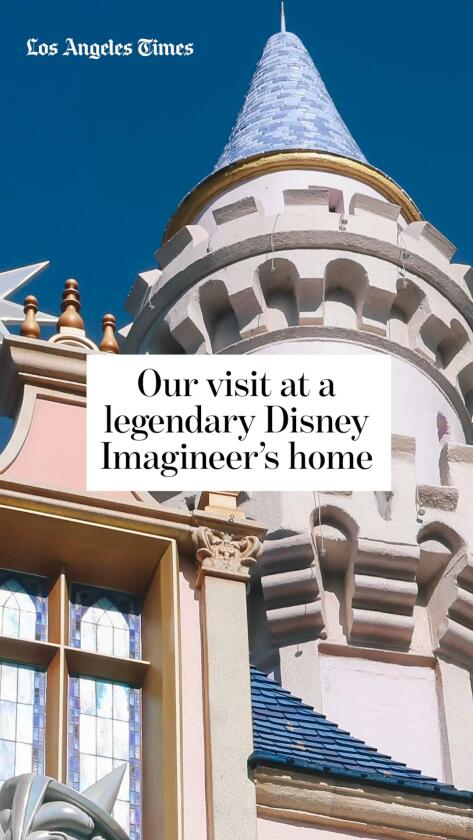 Share
Share
Share through Shut further sharing choices
At the moment, Gurr has turn into one of many extra public-facing advocates for classic Disney tales. He hosts a month-to-month bus tour, Bob Gurr’s Waltland, which visits integral Disney websites round L.A. It typically sells out in minutes, as followers know that Gurr, 93 and nonetheless fiery, is a wealth of Walt-era tales concerning the creation of Disneyland and Walt Disney Imagineering, the secretive arm of the corporate dedicated to theme park experiences.
He shares them with followers repeatedly at Disneyland, in addition to on his YouTube manufacturing “The Bob Gurr Show.” This Saturday, a documentary on his profession, “Bob Gurr: Living by Design,” will premiere on the Alex Theatre in Glendale, the neighborhood through which Gurr grew up.
He does all this, he says, as a result of it’s enjoyable to speak about his work — he says within the movie’s trailer that he’s finished “250 basic jobs.” However he additionally views it as one thing of a mission. “Walt was Walt,” says Gurr, who’s susceptible to speak in exaggerated tones with excitable gestures. “As time goes on, people think he’s a company or a brand. I come across people who didn’t know he was a person.” And, he provides, few stay who labored with Walt personally.

Artist-proof fashions of Gurr’s unique monorail designs casually sit on his residence espresso desk
(David Fouts / For The Instances)
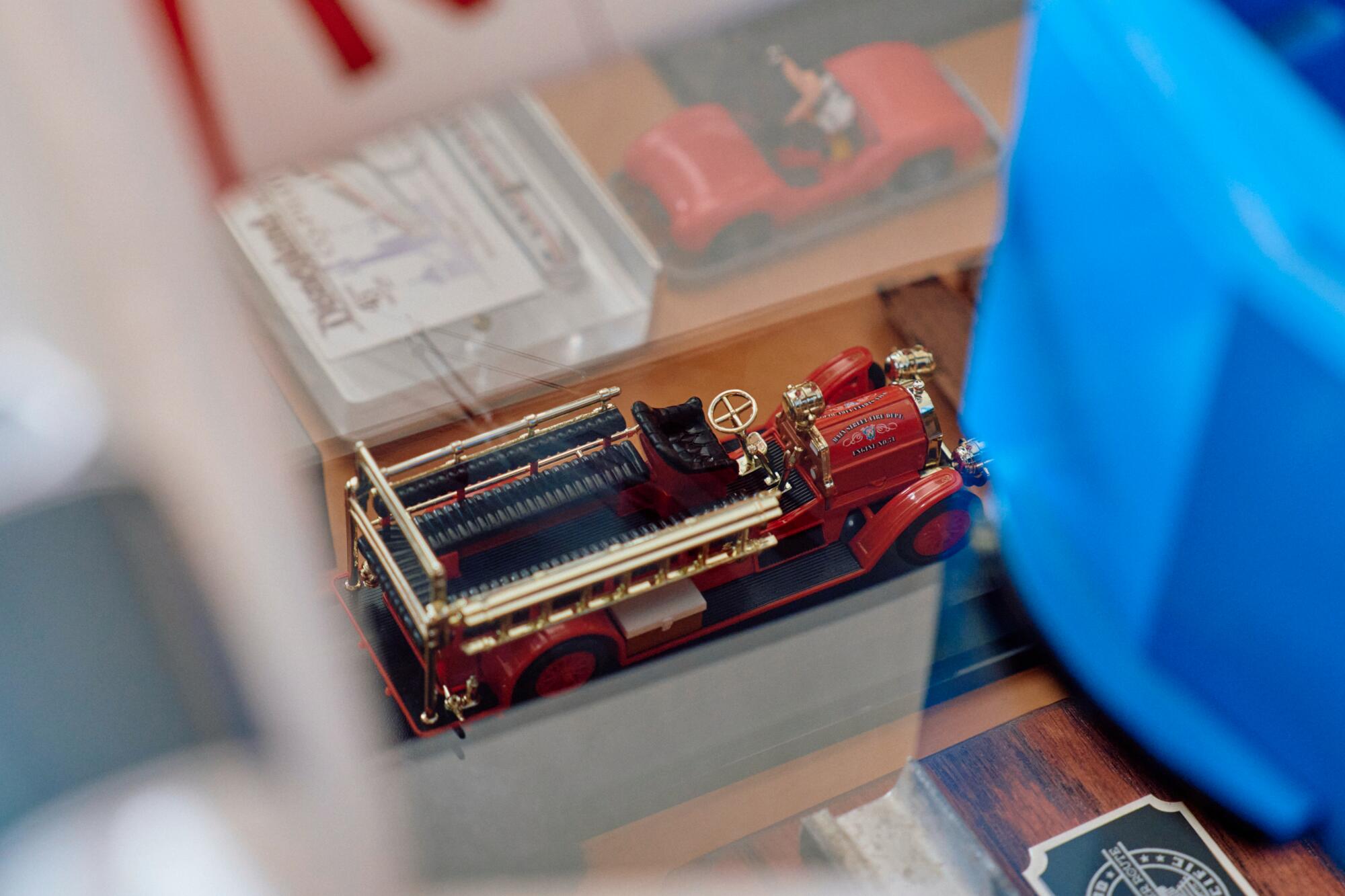
A few of Bob Gurr’s mannequin automobile assortment. One in all Gurr’s favourite designs was the classic hearth engine for Disneyland.
(David Fouts / For The Instances)
On a latest morning at his Tujunga residence, Gurr was getting a bit of wistful. Sitting in a front room overflowing with tchotchkes — a few of them extremely useful to Disney followers, similar to artist-proof fashions of Gurr’s unique monorail designs that casually sit on a espresso desk — Gurr draped one in every of his legs over the arm of a chair and talked about why his hearth engine is so significant.
It’s that small, early twentieth century open-air car that turned one in every of Walt’s favorites. “The last photograph of Walt in his park, what was it?” Gurr asks, referring to a Renie Bardeau image of Disney behind the wheel within the carriage of a automobile in entrance of Sleeping Magnificence Fort. “Sitting there in the fire engine with his buddy Mickey Mouse. That was the last photo in Disneyland before he was gone. So that little fire engine has had a circle of life.”
In some ways, so has he.
Gurr’s life has been one in every of fixed exercise. Born in 1932 and raised only a quick stroll from Glendale’s Grand Central Airport, now a part of the Disney campus, Gurr grew up airplane- and car-obsessed, ultimately attending ArtCenter to check car design.
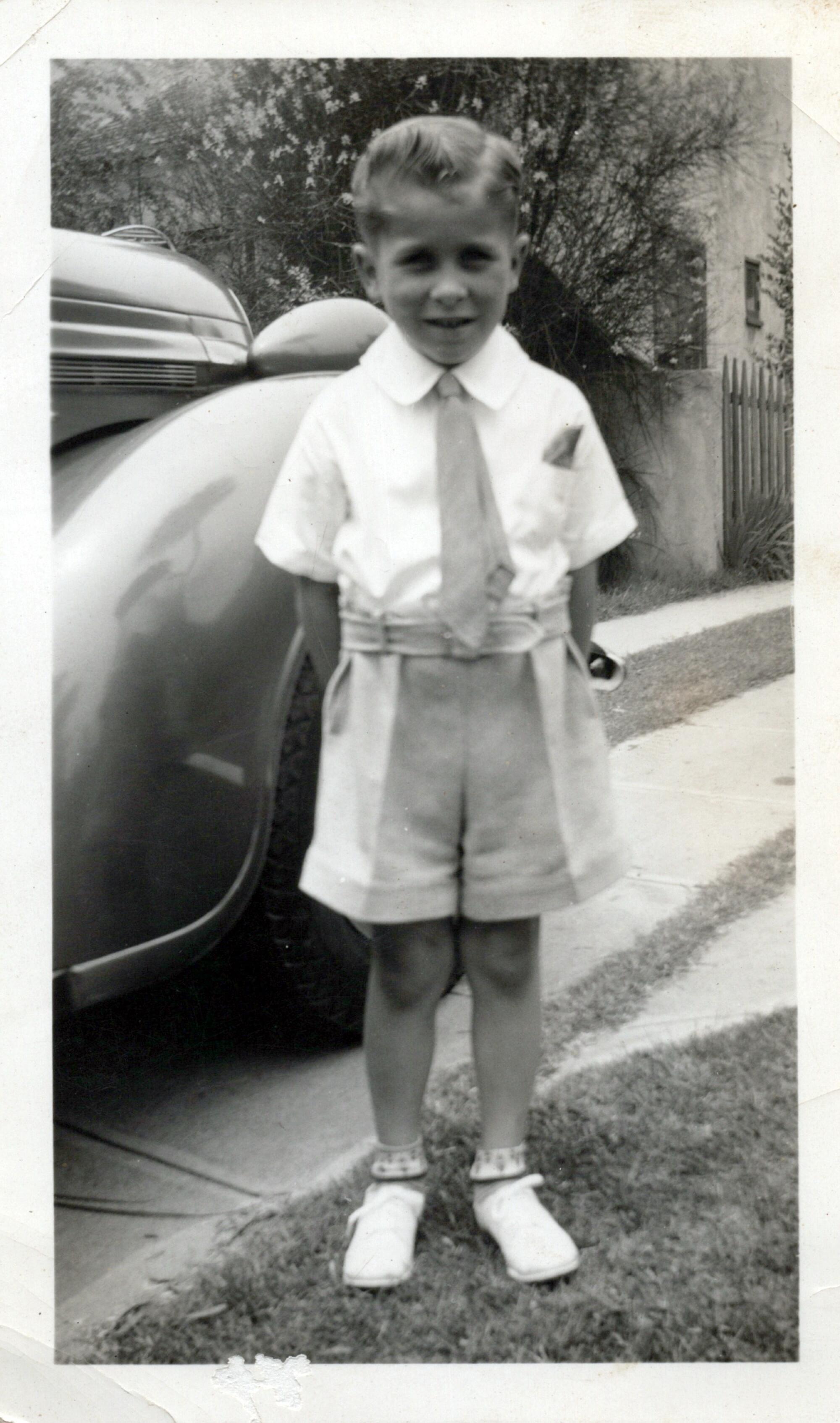
A younger Bob Gurr. The Disney legend grew up in Glendale.
(Courtesy of Bob Gurr)
His first main post-ArtCenter gig was in Detroit, working briefly for the Ford Motor Co. On his espresso desk sits a gleaming metallic hood decoration, a winged pointed determine that appears like a mock spaceship that Gurr hoped would grace a brand new Lincoln. It was rejected, however he holds it proudly at this time as one in every of his first skilled designs.
“The company did not like it, but I loved it and stole it and took it home,” he says.
Lacking the West Coast, nonetheless, Gurr returned to L.A. Although the Disney firm wasn’t on his radar, Gurr says he was shut with Ub Iwerks and his household, having gone to high school with one in every of Ub’s sons. Iwerks was instrumental within the growth of Mickey Mouse and sometimes a detailed collaborator and enterprise companion with Walt Disney. “I knew he worked at Disney,” Gurr says, “but he never told me what he did.”
Gurr was requested to check out what would turn into Autopia and provide his design concepts. He was employed.
“Bob was quickly identified as one of the can-do people,” says Tom Morris, a former Imagineer turned author-historian on the division. “The ones who said ‘yes’ to an opportunity, even if they weren’t really sure they could do it. Bob had that natural inclination, along with a strong curiosity and that thing Ray Bradbury called ‘optimistic behaviorism,’ the ability to be realistic and practical.”
Gurr met Disney on one in every of his first days on the job engaged on the Autopia automobiles, a narrative he tells typically. Gurr didn’t acknowledge the corporate patriarch — “an older guy, unshaven, kinda ratty looking” — when he put his leg up on one of many tires of the mini-car. However the two rapidly obtained alongside.
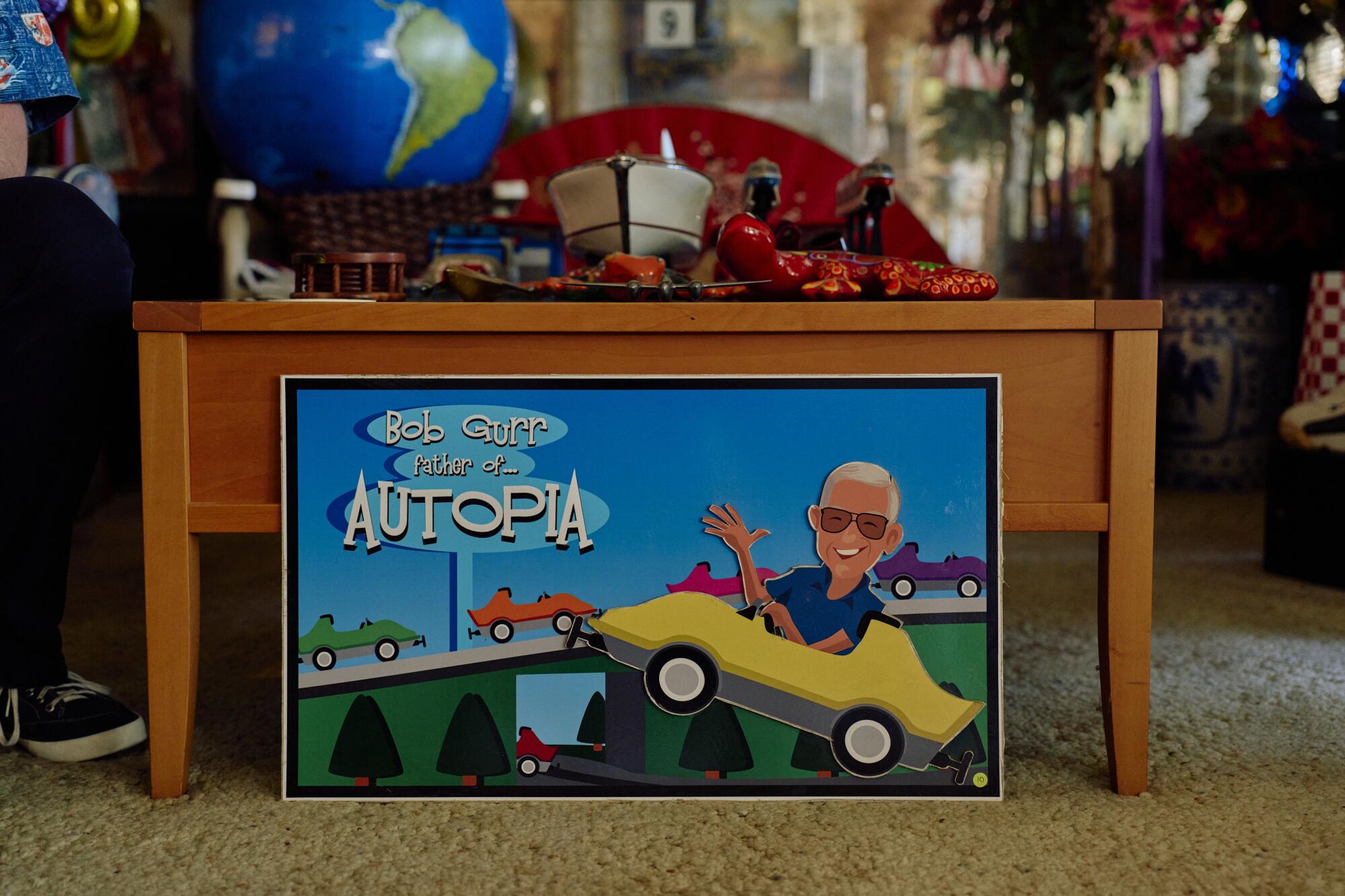
Bob Gurr first met Walt Disney whereas designing the Autopia automobiles at Disneyland.
(David Fouts / For The Instances)
“He always came in at least once a week and sat down and talked to me,” Gurr says. “I found out later he didn’t do that with everybody. I think the kind of stuff I did — cars, and I could come up with stuff very quickly — was stuff he would like to have in his park. But he doesn’t give ‘atta-boys.’ He doesn’t thank anybody. He does it in a very subtle manner, but very seldom people are thanked. I think his attitude was, ‘There’s no point in giving an ‘atta-boy,’ because if I hired you and you’re here and you’re doing stuff, why would I thank you?’
Gurr backs up.
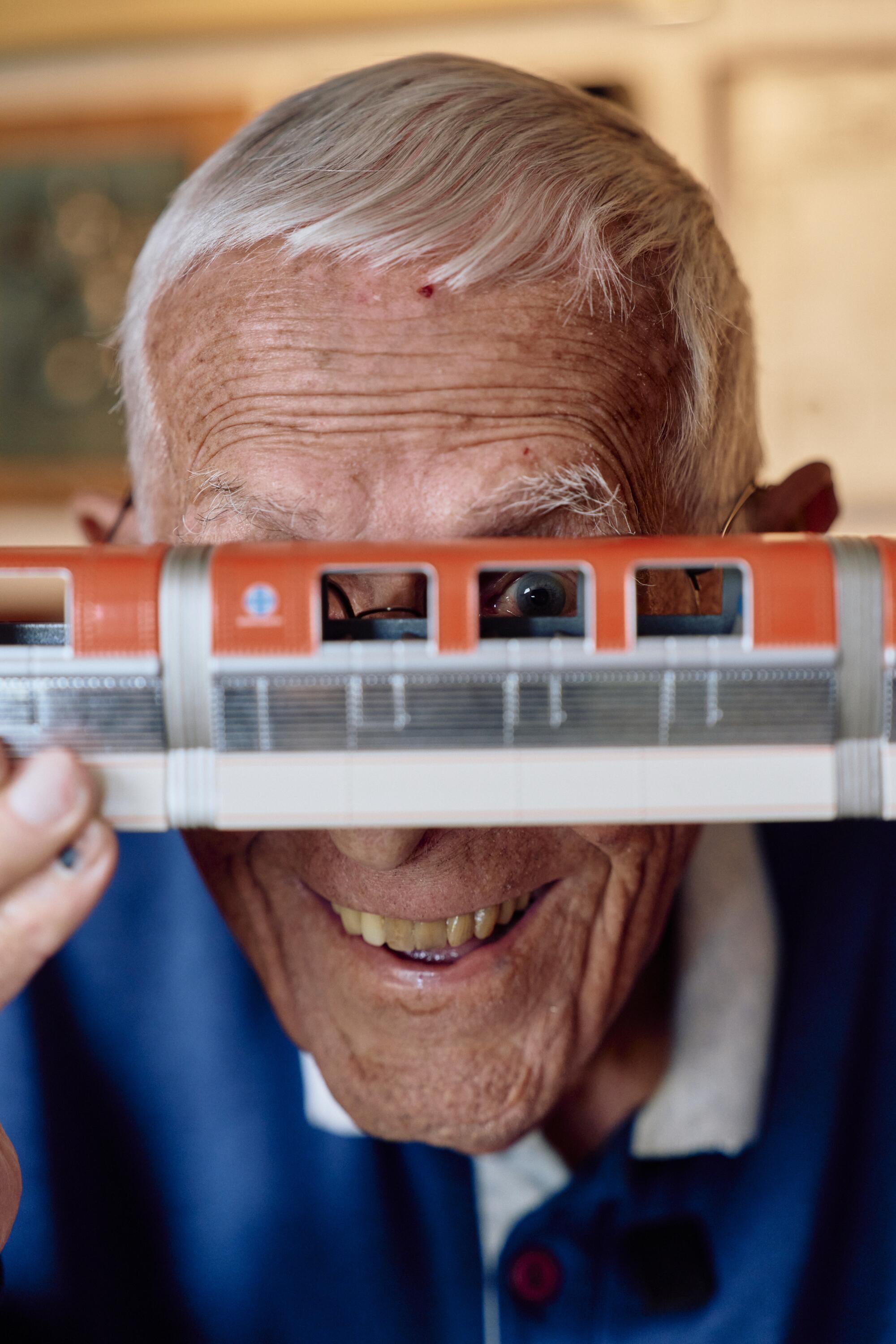
Bob Gurr says he drew his first monorail designs in about three days. Here, he holds a model one of his creations.
(David Fouts / For The Times)
He notes he was thanked, in Disney’s peculiar way, once in his career, and that’s when he was working on the Disneyland Monorail, which debuted in the park in 1959. Gurr created the initial design, a “Buck Rogers”-inspired house age car, as Gurr needed it to really feel modern and prepared for liftoff. The unique drawing of the monorail, stenciled by Gurr inside three days of getting the task and coloured by John Hench, hangs in Gurr’s front room.
Finally, Gurr additionally was tasked with overseeing its manufacturing. Gurr recollects in the future through which he was engaged on a half-built monorail practice in a soundstage and was paid a go to.
“The finance guy pulled me aside and handed me an envelope,” Gurr says. “He says, ‘Walt can’t understand how you do this, but he’d like you to have this.’ I opened the envelope and it was 10 $100 bills in 1959. I took that as an ‘atta-boy,’ but he didn’t want to tell me.”
Gurr speaks with a mixture of humor, directness and curiousity, wanting to share tales but additionally not somebody who overly romanticizes them. Requested about his design philosophy, as an example, and Gurr dispenses with large theories and as an alternative focuses on cautious pragmatism.
“If you over-anticipate and then something doesn’t work, you have a downer,” Gurr says. “I did this with everything I ever designed. ‘This thing is going to work because…’ And I have to prove every single step. You plot every detail, but you don’t anticipate guaranteed success. It’s a cautionary approach to life. People, say, ‘Oh, I hope, oh I dream.’ No, no no.”

One in all Gurr’s earliest designs, a gleaming metallic hood decoration he created for the Ford Motor Co. It was rejected.
(David Fouts / For The Instances)
Gurr is instructed such a philosophy appears to conflict with an organization that made wishing upon a star — and phrases similar to “If you can dream it, you can do it” — a part of its model.
“Think like a Buddhist,” Gurr says. “Dream, wish and hope are dangerous words. You get yourself thinking and set up for disappointment. Stay on the reality side. Then if it didn’t work, we’re going to figure out what we’re going to do now.”
Suppose like a Buddhist. Dream, want and hope are harmful phrases. You get your self considering and arrange for disappointment.
— Bob Gurr, legendary Disneyland designer

Bob Gurr designed a 30-foot tall King Kong animatronic for Common Studios Hollywood.
(Courtesy of Bob Gurr)
Gurr provides an instance from his profession. He was introduced in comparatively late to the venture that might turn into “Great Moments With Mr. Lincoln”; the long-running present incorporates a robotic Abraham Lincoln and debuted at New York’s 1964 World’s Truthful and was put in at Disneyland the next yr. The Lincoln animatronic wasn’t shifting with the realism that Disney was demanding, and Gurr was instructed he had about three months to determine it out. Gurr started dissecting the determine’s innards, working primarily with elements from the airline business.
“I didn’t know anything about the shape of humans,” Gurr says. “I’m a car and airplane guy. And 90 days is a rushed job. But I figured out how to build a structure with a human figure. Someone else had worked on it, and it didn’t quite work. But I can look at a human and see something like an airplane — a lightweight, tubular structure. When you look at something and you’re not trained, you see it with a different filter.”
The dialog inevitably turns to the upcoming Disneyland present “Walt Disney — A Magical Life,” which is able to briefly displace “Great Moments With Mr. Lincoln” throughout Disneyland’s seventieth anniversary celebrations. “A Magical Life” is ready to debut July 17, Disneyland’s official anniversary, and can function an animatronic of Disney, which the corporate has teased is its most lifelike robotic determine up to now.
Gurr is requested for his ideas, particularly how Disney might have felt to be became a mechanical creation. However he doesn’t chunk; Gurr notes that the Walt Disney Co. has him sworn to secrecy on the matter.
“I am embargoed,” Gurr says. “I see, I know and I follow it, but I’m embargoed to say nothing. The public, though — there will be quite a reaction, I’ll say.”
Gurr is often an open ebook, particularly as he has grown into his standing as a mentor and a job mannequin. Lately, as an example, Gurr has turn into extra snug discussing his private life. For a lot of his skilled profession, Gurr was a closeted homosexual man, coming of age throughout the Nineteen Fifties period of Joseph McCarthy and the Lavender Scare, the anti-communist purge of LGBTQ+ individuals from the U.S. authorities.
Gurr isn’t shy concerning the matter at this time, and he is aware of there’s curiosity, particularly as a result of, no less than publicly dealing with, the Walt Disney Co. has at occasions leaned conservative. In 1987, as an example, Disneyland hosted an AIDS Venture Los Angeles fundraiser as a mea culpa for as soon as banning same-sex dancing. As Gurr says, “You can have a very stiff Disney company. Mickey Mouse. Everything’s sweet.”
But Gurr stresses that matter not often got here up throughout his time at Disney. As soon as, he says, he caught two friends putting a guess on his sexuality at a Walt Disney World occasion, however he laughed it off. And so far as his large boss was involved, Gurr desires to state for the document that Walt Disney had little curiosity within the private lives of his employees.
“Walt ignored all of that,” Gurr says. “He saw the talent. He had a bigger, broader picture.”
Gurr is, nonetheless, requested if he needs the Walt Disney Co. and others can be extra progressive of their storytelling, Disney not too long ago eliminated a transgender athlete storyline from the critically acclaimed Pixar animated sequence “Win or Lose.” In an announcement on the time, Disney mentioned it acknowledged “many parents would prefer to discuss certain subjects with their children on their own terms and timeline.”
Gurr doesn’t disguise his emotions concerning the present political local weather. He worries, as an example, that Hollywood might keep away from such narratives throughout Donald Trump’s presidency. And but he takes a wide-angle view, noting that at his age he’s lived by way of quite a few cultural ebbs and flows.
“Everybody’s quieting down because we got Trump a second time,” Gurr says, criticizing the administration’s crackdown on DEI-based applications and labeling the president a “bully.” “So I think everybody is laying low. The DEI pushback is quite serious. But long term in civilizations, these pendulums swing back and forth. I grew up in the era of Sen. McCarthy and J. Edgar Hoover, an era where you dare not leave the slightest hint and you never used the word gay. It was assumed gay people were a diseased threat, and you had to design two lives for yourself.”

Bob Gurr, high proper, and staff work on the Disneyland Monorail.
(Courtesy of Bob Gurr)
The movie “Living by Design” digs deep into Gurr’s historical past, full with footage of him from the Nineteen Thirties. The main target is totally on Gurr’s passions, the hobbies and topics that formed his design work and led to his initiatives for Disney. It goals to point out, says director Frank H. Woodward, Gurr’s curiosity and fearlessness; as an example, he was the primary man down an unfinished Matterhorn monitor.
“We hadn’t gotten it all the way to bottom yet, so we had hay bales to stop the car in case it didn’t stop,” Gurr says. “My boss looked at me and said, ‘Robert, you designed it, you ride it.’”
Gurr hasn’t seen the movie but. He needed to attend to expertise it with an viewers. Woodward says after the Alex Theatre exhibiting on Saturday, he and Gurr plan to tour the movie, visiting different areas round Southern California and hopefully a visit to Florida for the Walt Disney World crowd. With Disneyland’s seventieth anniversary on the thoughts of many a park fan, the timing for the movie must be proper.
As somebody who has by no means slowed down and by no means stopped wanting forward, Gurr is requested what his message can be to these entrusted with making certain that Disneyland is ready for its subsequent 70 years.
‘Bob Gurr: Dwelling By Design’
“Just do it right,” Gurr says. “Every detail of everything you do, make sure you’re doing it in the best possible way that you can. The choices a person makes, whether it’s legal work, medical work, science, cartoons or Disneyland vehicles, do it your absolute best. That will make sure you’ll be much more successful than if you just clock in and out to do the job and go home.”
Gurr’s defining Disney creations — the sci-fi-inspired monorails of Disneyland and Walt Disney World, the primary implementation of a tubular metal coaster within the Matterhorn — are only a small fraction of his résumé. He would architect a 30-foot animatronic King Kong that after stood at Common Studios Hollywood, work with Steven Spielberg on the dinosaur figures for “Jurassic Park,” assemble a continuously sinking ship at Las Vegas’ Treasure Island and construct a flying UFO for the closing ceremonies of the 1984 Los Angeles Summer season Olympics.
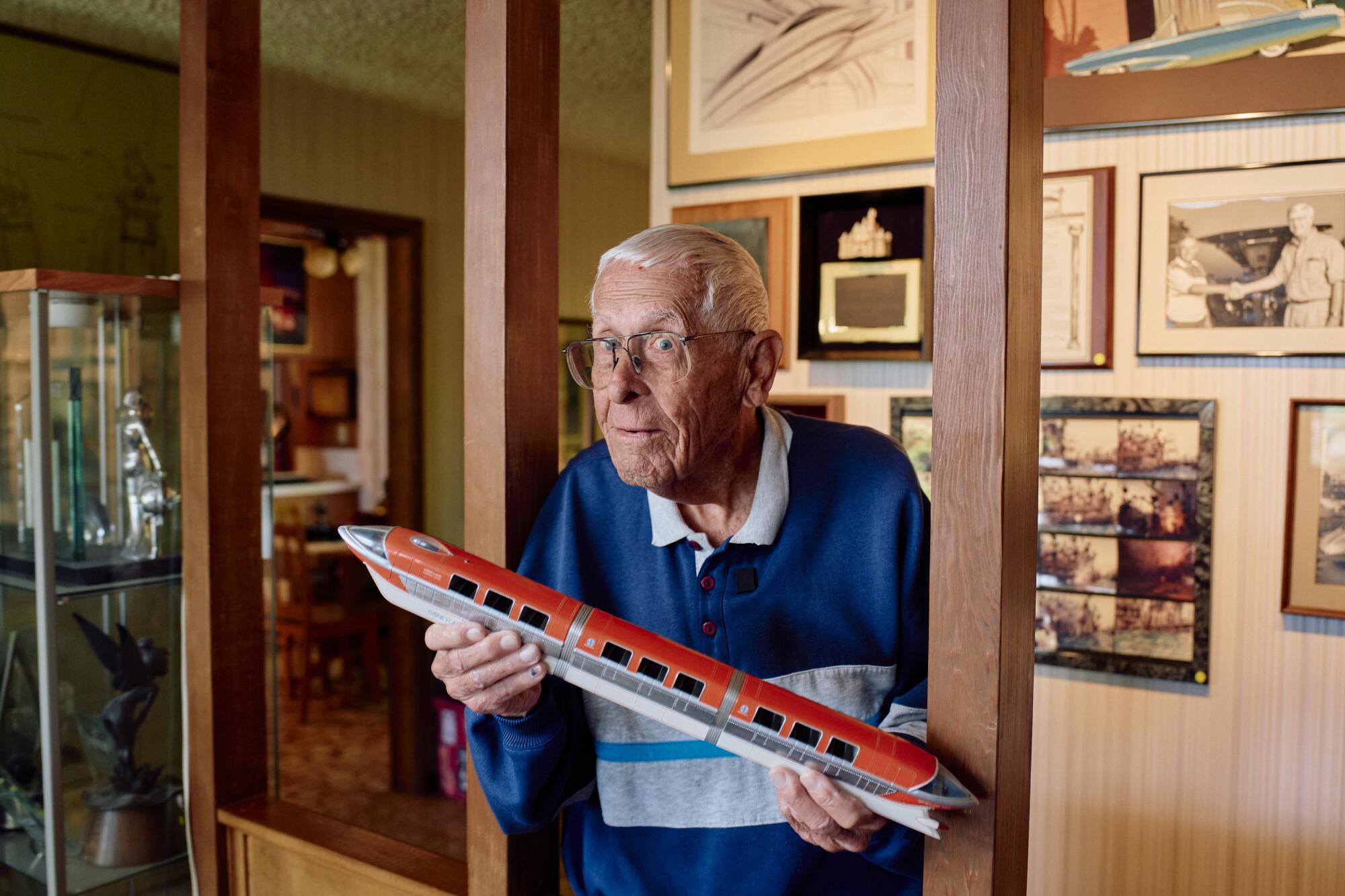
Bob Gurr says he was impressed by sci-fi franchise “Buck Rogers” in designing the Disneyland Monorail.
(David Fouts / For The Instances)
In his spare time, he repeatedly flew glider planes, a interest of his for 50 years. He’s not piloting as of late, however virtually each day he’ll sit in his workplace and get behind a simulator to function digital planes or helicopters. It’s how, Gurr says, he works out his thoughts. “Somebody told me, ‘You’re a kid playing ‘Fortnite.’ I’ve got rudder pedals on the floor and all these controls. The airplane is extremely real to fly.
“This is the way I test if Alzheimer’s were to come,” he continues, gesturing to his pc setup in his workplace. “The first time I would see that is that if I had difficulty flying a helicopter — taking off and flying. It’s a severe test of your brain.”
And it’s secure to say that at this time, Gurr’s thoughts — along with his physique of labor — nonetheless soars.


